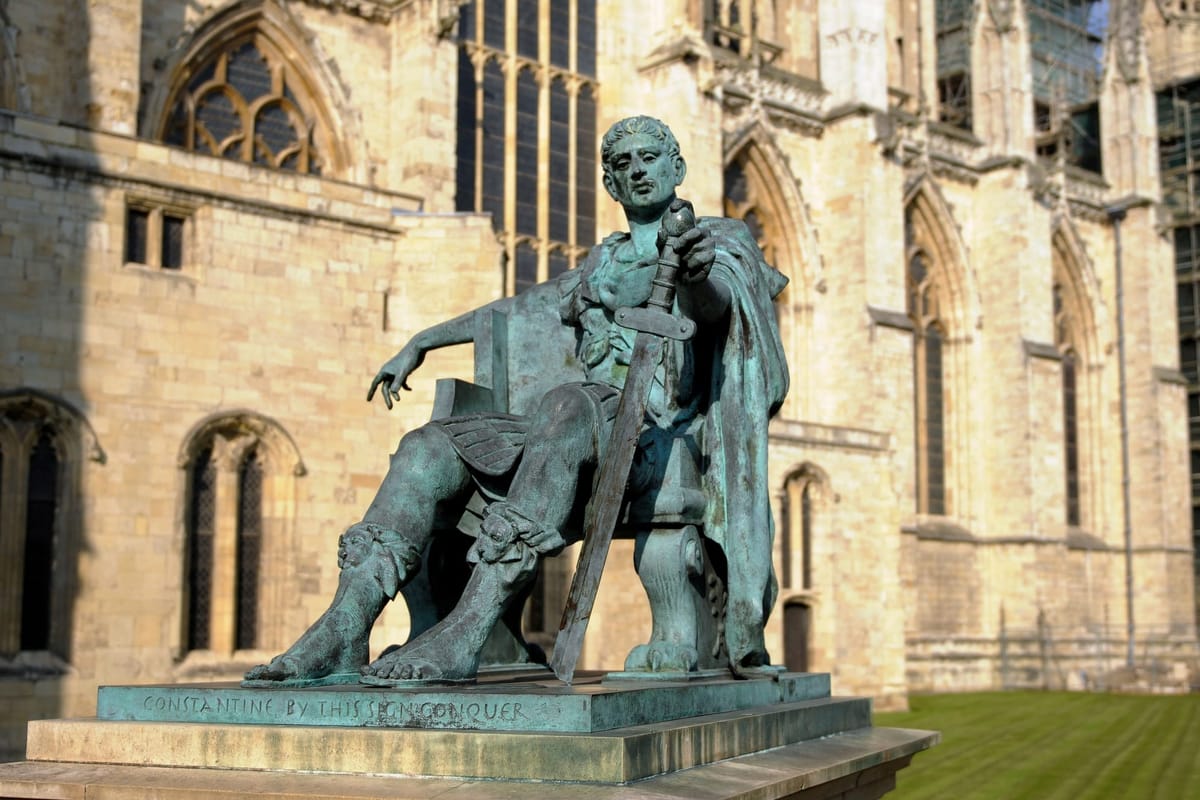Constantine becomes Emperor
On the venerable day of the Sun let the people rest, and all workshops be closed.

Key words
- Edict: a public order given by an authority
The City Council issued an edict against spitting in the street.
- Orthodoxy: the traditional beliefs of a religious group or political party
She is a strict defender of Catholic orthodoxy.
- Heresy: a belief that is against the principles of a particular religion
He was burned at the stake for heresy in the 15th century.
- Decree: an official statement that something must happen
He refused to carry out the board’s decree.
- Convene: to bring together a group of people for a meeting, or to meet for a meeting
The council will be convening on the morning of the 25th.
Read the article to find the answers
- How did Constantine stop the persecution of Christians?
- How did he establish orthodoxy?
- What did he decree?
- What did he convene?
Constantine in York
Constantine was the son of a high-ranking Roman military officer who later became Emperor. Following in his father's footsteps, he rose through the ranks of the Roman military and fought against the Britons based in the Roman city that would become York, spending a year with his father, who was seriously ill.
Before he died, his father declared that he wanted his son, Constantine, to become Emperor. A famous king who had sided with the Romans and become a general in the Roman military proclaimed Constantine the new Roman Emperor and the Roman troops in York and throughout Britain gladly accepted him.
Policies & Edicts
Constantine stopped the persecution of Christians and legalized Christianity by issuing the Edict of Milan, which stated that Christians should be allowed to practice their faith without oppression.
He gave himself authority over the early Christian councils and established orthodoxy by defining and enforcing what was heresy, proper worship, and doctrine. He built churches, exempted the clergy from taxes, and promoted Christians to high positions in the government.
He decreed that Sunday should be a day of rest for all citizens, effectively naming Sunday as the day of Christian church attendance, changed the observance of the Jewish Passover to the European Easter, and set December 25th as Christmas Day, marking a definitive break between Christianity and Jewish tradition. From then on, the solar Julian calendar took precedence over the lunisolar Hebrew calendar in the Christian churches of the Roman Empire.
The Nicene Creed
In 325, he convened the First Council of Nicaea, which established the Nicene Creed. In the Roman Catholic Church, it is necessary to attend church and recite the Sunday prayers, the Nicene Creed, and the Hail Mary in order to receive an indulgence. Some other Christians, known as Preterists, believe that only Scripture is truly authoritative and claim that the line in the Nicene Creed that reads:
And He shall come again with glory to judge both the living and the dead.
contradicts the words of Jesus, who said:
This generation shall not pass away, until all these things be fulfilled ... the time is at hand ... these things will be done shortly ... I am coming back quickly.
Preterists, believe that all prophecies in the Bible were fulfilled in 70 AD when the temple in Jerusalem was destroyed.
Discussion questions
- Do you have any questions about any of the vocabulary or grammar in this article?
- What do people normally do on Sunday in your country?
- Do people in your country celebrate Easter?
- Have you read the Nicene Creed?

Book a Lesson
Improve your English language communication skills by practicing with a qualified and experienced native speaker.





